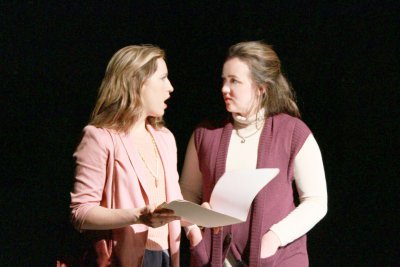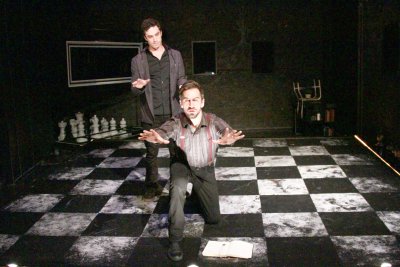The Black Book
What this psychological thriller lacks in coherence, it makes up for in suspense.

Gabe Templin, Sean Borderes and David Siciliano in a scene from “The Black Book” (Photo credit: Andrew Zeiter)
[avatar user=”Daniel J. Lee” size=”96″ align=”left” ] Daniel J. Lee, Critic[/avatar] The Black Book, the ambitious psychological thriller currently playing at the American Theatre of Actors, depicts writer and director Phil Blechman’s struggle with a compelling question: what prompts a person to commit suicide? The fact that statistics show the startling frequency of teen suicide in
America makes this a particularly apt one to ask. However, it is likewise an exceedingly difficult one to answer. This fast-paced, decade-spanning trip of unsettling imagery and incisive text addresses issues of adolescent obsession, depression and aggression but fails to culminate in a cogent thesis on the subject it claims to address.
The Black Book follows the faculty of United University while they attempt to unravel the mystery surrounding a difficult student named Collin Archer and a suicide on campus. Drama instructor Axel Cooper works together with his co-workers Arthur Chase, Julie Edwards and Riley Andrews to decipher the boy’s disturbing set of clues. As the action rises, motives are questioned, allegiances are
challenged, and the lines between reality and delusion are blurred. Time and space spiral out ofcontrol in a climax beyond (or maybe just shy of) the point of coherence.
This is not to say that the production is difficult to watch. Make no mistake: Blechman’s engaging
script and clipped direction are clearly calculated. Each line weaves together with another, forming an intricate web of detail and nuance. Rather, the issue lies in the calculation itself. The various moving pieces of his text tell a story that is ambiguous to its own detriment. The result is something a shade away from a brilliant Christopher Nolan screenplay: thoroughly gripping from start to finish but failing to achieve the satisfying point of dizzying cohesion required of such stories. In this case, the sum of the play’s parts is greater than the whole.
Thematically central to the plot is set designer Ann Beyersdorfer’s likewise confusing human-sized chess set. Scattered across the multi-leveled stage, the pieces seem to signify the paradoxical multitude and lack of agency we possess in our own lives. They suggest that our circumstances simultaneously present us a nearly infinite combination of options and an equally large number of unforeseeable obstacles. However, this assertion is only vaguely alluded to in the dialogue and instead specifically explicated in the program notes. To the theatergoer less interested in supplemental reading, the image onstage is a confounding one; characters carry massive pawns across the checkered stage floor for seemingly no reason.
What The Black Book lacks in coherence, however, it makes up for in suspense, a fact at least partially attributable to its particularly strong set of actors. David Siciliano conducts the proceedings as Collin, spitting out introspective monologues and rapid fire dialogue with razor sharp wit; with the twist of a lip and the flick of a cigarette, he is alternately charming and terrifying. His intense portrayal of a tortured college student is matched by Sean Borderes’ equally conflicted Professor Axel Cooper, Gabe Templin’s endearingly earnest Professor Arthur Chase, and Haley Dean’s winningly naive student Nicole.
What prompts a person to commit suicide? Blechman’s script provides its audience no discernible conclusions, and yet this fact does little to hinder its entertainment value. I find myself revisiting various moments of the play, trying in vain to solve its mystery. Perhaps this is as it should be. Perhaps this is a question we are equipped to definitively answer.
The Black Book (through November 22, 2015)
The American Theatre of Actors
314 W. 54th Street, in Manhattan.
For tickets, call 802-282-4289 or visit http://www.theblackbook.nyc
Running time: 105 minutes with no intermission








Leave a comment